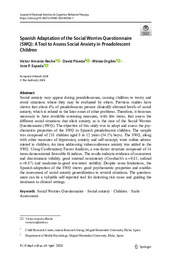Por favor, use este identificador para citar o enlazar este ítem:
https://hdl.handle.net/11000/38343Registro completo de metadatos
| Campo DC | Valor | Lengua/Idioma |
|---|---|---|
| dc.contributor.author | Amorós-Reche, Víctor | - |
| dc.contributor.author | Pineda, David | - |
| dc.contributor.author | Orgilés, Mireia | - |
| dc.contributor.author | ESPADA, JOSE P. | - |
| dc.contributor.other | Departamentos de la UMH::Psicología de la Salud | es_ES |
| dc.date.accessioned | 2025-11-20T10:27:53Z | - |
| dc.date.available | 2025-11-20T10:27:53Z | - |
| dc.date.created | 2024 | - |
| dc.identifier.citation | Journal of Rational-Emotive & Cognitive-Behavior Therapy | es_ES |
| dc.identifier.issn | 1573-6563 | - |
| dc.identifier.issn | 0894-9085 | - |
| dc.identifier.uri | https://hdl.handle.net/11000/38343 | - |
| dc.description.abstract | Social anxiety may appear during preadolescence, causing children to worry and avoid situations where they may be evaluated by others. Previous studies have shown that about 4% of preadolescents present clinically elevated levels of social anxiety, which is related to the later onset of other problems. Therefore, it becomes necessary to have available screening measures, with few items, that assess the different social situations that elicit anxiety, as is the case of the Social Worries Questionnaire (SWQ). The objective of this study was to adapt and assess the psychometric properties of the SWQ in Spanish preadolescent children. The sample was composed of 218 children aged 8 to 12 years (54.1% boys). The SWQ, along with other measures of depression, anxiety and self-concept, were online administered to children. An item addressing videoconference anxiety was added to the SWQ. Using Confirmatory Factor Analysis, a one-factor structure composed of 14 items demonstrated favorable fit indices. The results indicate evidence of concurrent and discriminant validity, good internal consistency (Cronbach’s α = 0.81; ordinal α = 0.87) and moderate-to-good test-retest stability. Despite some limitations, the Spanish adaptation of the SWQ shows good psychometric properties and enables the assessment of social anxiety generalization to several situations. The questionnaire can be a valuable self-reported tool for detecting risk cases and guiding the treatment in clinical settings. | es_ES |
| dc.format | application/pdf | es_ES |
| dc.format.extent | 16 | es_ES |
| dc.language.iso | eng | es_ES |
| dc.publisher | Springer | es_ES |
| dc.relation.ispartofseries | 42 | es_ES |
| dc.rights | info:eu-repo/semantics/openAccess | es_ES |
| dc.rights | Attribution-NonCommercial-NoDerivatives 4.0 Internacional | * |
| dc.rights.uri | http://creativecommons.org/licenses/by-nc-nd/4.0/ | * |
| dc.subject | Social Worries Questionnaire | es_ES |
| dc.subject | Social anxiety | es_ES |
| dc.subject | Children | es_ES |
| dc.subject | Scale | es_ES |
| dc.subject | Assessment | es_ES |
| dc.subject.other | CDU::1 - Filosofía y psicología::159.9 - Psicología | es_ES |
| dc.title | Spanish Adaptation of the Social Worries Questionnaire (SWQ): A Tool to Assess Social Anxiety in Preadolescent Children | es_ES |
| dc.type | info:eu-repo/semantics/article | es_ES |
| dc.relation.publisherversion | https://doi.org/10.1007/s10942-024-00546-1 | es_ES |

Ver/Abrir:
Amoros-Reche et al., 2024.pdf
1,08 MB
Adobe PDF
Compartir:
 La licencia se describe como: Atribución-NonComercial-NoDerivada 4.0 Internacional.
La licencia se describe como: Atribución-NonComercial-NoDerivada 4.0 Internacional.
.png)